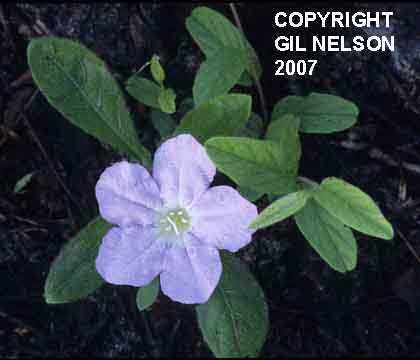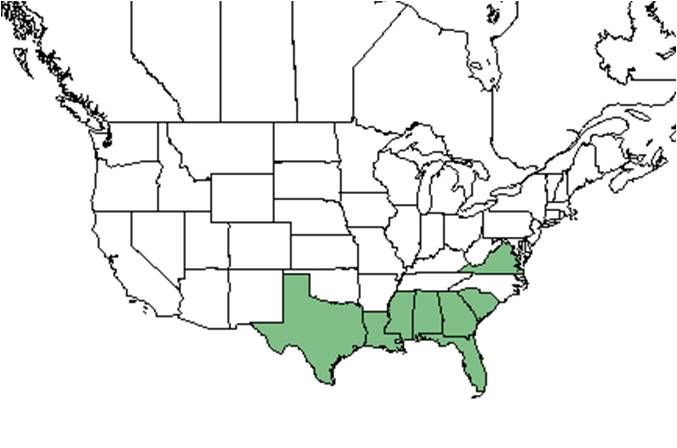Difference between revisions of "Ruellia ciliosa"
(→Distribution) |
(→Ecology) |
||
| Line 27: | Line 27: | ||
===Habitat=== <!--Natural communities, human disturbed habitats, topography, hydrology, soils, light, fire regime requirements for removal of competition, etc.--> | ===Habitat=== <!--Natural communities, human disturbed habitats, topography, hydrology, soils, light, fire regime requirements for removal of competition, etc.--> | ||
===Phenology=== <!--Timing off flowering, fruiting, seed dispersal, and environmental triggers. Cite PanFlora website if appropriate: http://www.gilnelson.com/PanFlora/ --> | ===Phenology=== <!--Timing off flowering, fruiting, seed dispersal, and environmental triggers. Cite PanFlora website if appropriate: http://www.gilnelson.com/PanFlora/ --> | ||
| − | + | It blooms from May through September (Nelson 2006). | |
===Seed dispersal=== | ===Seed dispersal=== | ||
===Seed bank and germination=== | ===Seed bank and germination=== | ||
===Fire ecology=== <!--Fire tolerance, fire dependence, adaptive fire responses--> | ===Fire ecology=== <!--Fire tolerance, fire dependence, adaptive fire responses--> | ||
| − | + | It flowers within two months of burning in early summer (K. Robertson). ''Ruellia ciliosa'' responds rapidly to fire and ma be seen as one of the more common plants in the ground cover after a prescribed burn. Within a few weeks or so, ''Ruellia ciliosa'', produces new leaves and flowers profusely but temporary (Nelson 2006). | |
===Pollination=== | ===Pollination=== | ||
===Use by animals=== <!--Herbivory, granivory, insect hosting, etc.--> | ===Use by animals=== <!--Herbivory, granivory, insect hosting, etc.--> | ||
===Diseases and parasites=== | ===Diseases and parasites=== | ||
| + | |||
==Conservation and Management== | ==Conservation and Management== | ||
==Cultivation and restoration== | ==Cultivation and restoration== | ||
Revision as of 17:56, 10 July 2015
| Ruellia ciliosa | |
|---|---|

| |
| Photo taken by Gil Nelson | |
| Scientific classification | |
| Kingdom: | Plantae |
| Division: | Magnoliophyta – Flowering plants |
| Class: | Magnoliopsida – Dicotyledons |
| Order: | Scrophulariales |
| Family: | Acanthaceae |
| Genus: | Ruellia |
| Species: | R. ciliosa |
| Binomial name | |
| Ruellia ciliosa (Pursh) R.W. Long | |

| |
| Natural range of Ruellia ciliosa from USDA NRCS Plants Database. | |
Contents
Description
The common name is Sandhills Wild Petunia or Ciliate Wild Petunia (Nelson 2006).
Distribution
It is found in sandhills of Florida, Georgia, South Carolina, and North Carolina (Nelson 2006).
Ecology
Habitat
Phenology
It blooms from May through September (Nelson 2006).
Seed dispersal
Seed bank and germination
Fire ecology
It flowers within two months of burning in early summer (K. Robertson). Ruellia ciliosa responds rapidly to fire and ma be seen as one of the more common plants in the ground cover after a prescribed burn. Within a few weeks or so, Ruellia ciliosa, produces new leaves and flowers profusely but temporary (Nelson 2006).
Pollination
Use by animals
Diseases and parasites
Conservation and Management
Cultivation and restoration
Photo Gallery
References and notes
- Robertson, Kevin M. 2014. Personal observation made at Pebble Hill Plantation, Grady County, Georgia.
- Nelson, Gil. Atlantic Coastal Plain Wildflowers: A Field Guide to the Wildflowers of the Coastal Regions of Virginia, North Carolina, South Carolina, Georgia, and Northeastern Florida. Guilford, CT: FalconGuide, 2006. 36. Print.